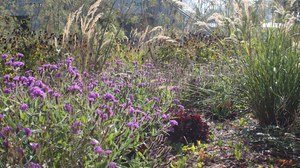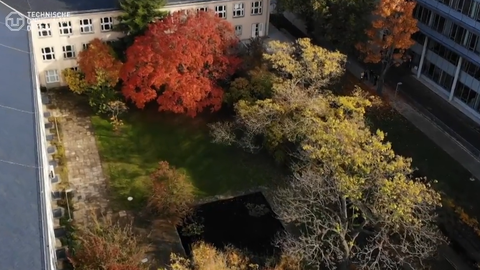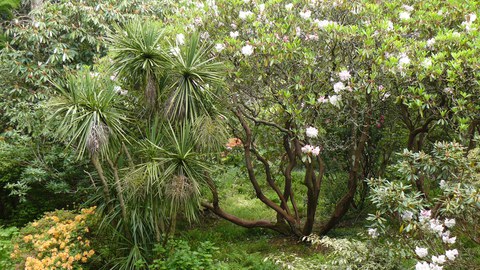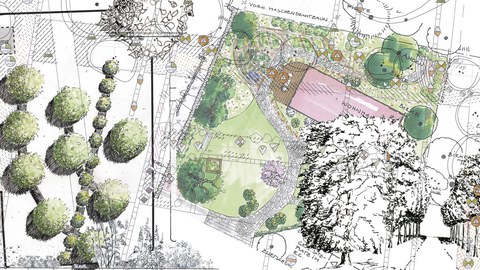Studieren an der Professur Pflanzenverwendung
Pflanzenkunde und Pflanzenverwendung sind vom ersten Semester an verzahnt. Beide Gebiete werden durch Vorlesungen vermittelt und mit Hilfe von Entwurfs- und Bestimmungsübungen vertieft.
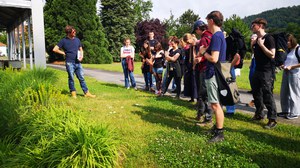 © Patricia Werner
© Patricia Werner
Studieren an der Juniorprofessur für Pflanzenverwendung
Die Lehre an der TU Dresden verknüpft Pflanzenkunde und Pflanzenverwendung bereits ab dem ersten Semester. Zur Vermittlung der Grundkenntnisse dienen Vorlesungen, dabei wollen wir immer gemeinsam lernen und ins Gespräch kommen. Einige der Veranstaltungen werden daher im Außenraum Campus stattfinden - von Walkaround-Vorlesungen zu ersten freiwilligen praktischen Einsätzen. Das erworbene Wissen wird in Entwurfs- und Bestimmungsübungen sowie begleitenden Übungen zur Pflanzenverwendung vertieft. Die aktuellen Inhalte können Sie der Übersicht der verschiedenen Module des Lehrgebiets entnehmen.
Für Gehölzaufnahmen im Gelände ist es notwendig, die Arten sowohl im Winter- als auch im Sommerzustand bestimmen zu können. Das Lehrgebiet bietet hierzu Tutorien an. Wöchentliche Rundgänge der studentischen Hilfskräfte ermöglichen das Lernen lateinischer und deutscher Namen auf Augenhöhe und dienen gleichzeitig der Übersicht vorhandener Vegetation auf dem Campus und im Botanischen Garten. Zur begleitenden Lernkontrolle werden die Pflanzenkenntnisse im Grundstudium jeweils durch ein Gehölz- bzw. Staudentestat am Semesterende geprüft.
In Vertiefungsmodulen werden bestimmte Spezialthemen aus der Pflanzenverwendung bearbeitet. Hier lernen die Studierenden entweder die Theoriearbeit oder lernen anhand von praktischen Tätigkeiten. Im Theoriefokus werten sie Literatur zur Freilandpflanzenkunde und- verwendung aus und legen ihre Erkenntnisse in wisschenschaftlich fundierten Texten dar, tragen sie mündlich vor und vertreten sie in der Diskussion. In der praktischen Pflanzenverwendung werden theoretische Inhalte in praktischen Einsätzen auf dem Campus in ihrer Umsetzung erlebt und wertvolle Erkenntnisse für die Gestaltung mit Pflanzen und die Entwicklung von Pflanzungen durch Pflege erprobt.
Vertiefungsprojekte sind fester Bestandteil des Studiums an der TU Dresden. Im dritten Semester des Master-Studiums werden praxis- und objektbezogene Themen planerisch und/oder theoretisch bearbeitet. Hierbei ist oft ein enger Bezug zu freiraumplanerischen Aufgaben oder Situationen gegeben.
Exkursionen sind für das Lehrgebiet Pflanzenverwendung besonders bedeutsam, um anschaulich verschiedene Standorte, Naturräume und Nutzungssituationen in ihrer Vegetationsausprägung zu vermitteln. Exkursionsziele sind u.a. Schaugärten, städtische Pflanzungen und Fachpersonen, die ihr Wissen mit den Studierenden teilen und einen Einblick in mögliche Berufswege bieten.
Das Lehrgebiet bietet durch Gastvorträge Einblicke in besondere Fragestellungen zu Pflanzenverwendung und der Pflege von Pflanzungen. Sie zeigen verschiedene Bepflanzungsstile auf oder befassen sich mit besonderen Themen, wie dem Regenwassermanagement und der Rolle vegetationsbestandener Flächen im Stadtraum.

